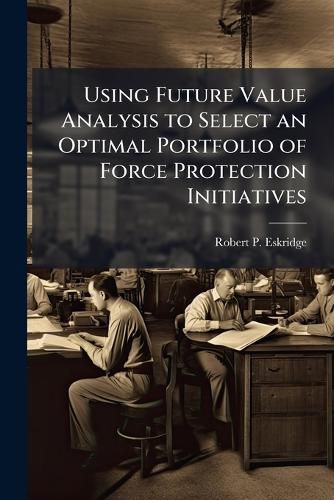Readings Newsletter
Become a Readings Member to make your shopping experience even easier.
Sign in or sign up for free!
You’re not far away from qualifying for FREE standard shipping within Australia
You’ve qualified for FREE standard shipping within Australia
The cart is loading…






With the recent increase in terrorist activity, force protection has become a key issue for the Department of Defense. Leading the research for new ideas and concepts in force protection for the US Air Force is the Air Force Force Protection Battlelab (FPB). The FPB is charged with searching out force protection ideas and selecting those most worthy for future consideration. In 2002, a Value-Focused Thinking (VFT) hierarchy was created to help the FPB select those ideas that provided the most value to the Air Force and it's force protection goals. This research effort uses the Future Value Analysis (FVA) approach, a decision-making methodology, to provide a more accurate project selection tool to the FPB. FVA incorporates the ideals of multi-attribute utility theory, specifically using the VFT process, as well as linear programming optimization techniques, to provide an optimal portfolio of initiatives for the FPB to pursue. FVA provides a solution that optimizes the value of initiatives selected, while remaining within the organizational constraints of the FPB.
This work has been selected by scholars as being culturally important, and is part of the knowledge base of civilization as we know it. This work was reproduced from the original artifact, and remains as true to the original work as possible. Therefore, you will see the original copyright references, library stamps (as most of these works have been housed in our most important libraries around the world), and other notations in the work.
This work is in the public domain in the United States of America, and possibly other nations. Within the United States, you may freely copy and distribute this work, as no entity (individual or corporate) has a copyright on the body of the work.
As a reproduction of a historical artifact, this work may contain missing or blurred pages, poor pictures, errant marks, etc. Scholars believe, and we concur, that this work is important enough to be preserved, reproduced, and made generally available to the public. We appreciate your support of the preservation process, and thank you for being an important part of keeping this knowledge alive and relevant.
$9.00 standard shipping within Australia
FREE standard shipping within Australia for orders over $100.00
Express & International shipping calculated at checkout
Stock availability can be subject to change without notice. We recommend calling the shop or contacting our online team to check availability of low stock items. Please see our Shopping Online page for more details.
With the recent increase in terrorist activity, force protection has become a key issue for the Department of Defense. Leading the research for new ideas and concepts in force protection for the US Air Force is the Air Force Force Protection Battlelab (FPB). The FPB is charged with searching out force protection ideas and selecting those most worthy for future consideration. In 2002, a Value-Focused Thinking (VFT) hierarchy was created to help the FPB select those ideas that provided the most value to the Air Force and it's force protection goals. This research effort uses the Future Value Analysis (FVA) approach, a decision-making methodology, to provide a more accurate project selection tool to the FPB. FVA incorporates the ideals of multi-attribute utility theory, specifically using the VFT process, as well as linear programming optimization techniques, to provide an optimal portfolio of initiatives for the FPB to pursue. FVA provides a solution that optimizes the value of initiatives selected, while remaining within the organizational constraints of the FPB.
This work has been selected by scholars as being culturally important, and is part of the knowledge base of civilization as we know it. This work was reproduced from the original artifact, and remains as true to the original work as possible. Therefore, you will see the original copyright references, library stamps (as most of these works have been housed in our most important libraries around the world), and other notations in the work.
This work is in the public domain in the United States of America, and possibly other nations. Within the United States, you may freely copy and distribute this work, as no entity (individual or corporate) has a copyright on the body of the work.
As a reproduction of a historical artifact, this work may contain missing or blurred pages, poor pictures, errant marks, etc. Scholars believe, and we concur, that this work is important enough to be preserved, reproduced, and made generally available to the public. We appreciate your support of the preservation process, and thank you for being an important part of keeping this knowledge alive and relevant.